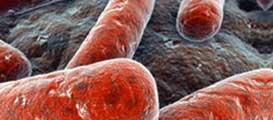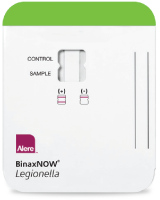Overview
 Since the original description of Legionnaires' disease in 1977, Legionella pneumophila has been increasingly recognized as a cause of sporadic and epidemic community-acquired pneumonia (CAP) in all age groups. L. pneumophila is the third- or fourth-most-frequent pathogen in CAP with a high incidence of admission to the ICU. It is also an important nosocomial pathogen because the hospital setting provides particularly susceptible populations.
Since the original description of Legionnaires' disease in 1977, Legionella pneumophila has been increasingly recognized as a cause of sporadic and epidemic community-acquired pneumonia (CAP) in all age groups. L. pneumophila is the third- or fourth-most-frequent pathogen in CAP with a high incidence of admission to the ICU. It is also an important nosocomial pathogen because the hospital setting provides particularly susceptible populations.
The Problem
Clinical manifestations are not useful in predicting the likelihood of Legionnaires' disease. Conventional microbiology methods have limitations reducing their sensitivity, while the failure of serological testing to diagnose the disease in the acute phase limits its potential to affect clinical decision making.
The Consequences
According to the IDSA/ATS CAP guidelines, empiric treatment of L. pneumophila is recommended using a macrolide or respiratory fluoroquinolone for every patient with community-acquired pneumonia. In one study, 11.2% of patients with L. pneumophila pneumonia received inappropriate empirical antibiotic therapy at hospital admission. Significantly, inappropriate empirical antibiotic therapy has been associated with early failure and higher mortality in patients with CAP.
Rapid Testing
Rapid, effective diagnosis and treatment reduces Legionellosis-associated mortality. Making a diagnosis of Legionella allows the practitioner to more accurately define the choice and duration of antimicrobial therapy. High rates of initial discordant antimicrobial treatment for Legionnaires' disease may be overcome by regular urine antigen testing for L. pneumophila in all hospitalized patients. The Alere BinaxNOW® Legionella urine antigen test provides results in just 15 minutes. Importantly, it provides highly sensitive results from the first few days of disease and its reliability is not affected by prior antibiotic administration. The urine antigen test is now the most common method used to make the diagnosis of Legionnaires' disease. Some doctors have recommended the use of the urinary antigen test for all patients with CAP who require hospitalization. Its ease of use and rapidity mean that targeted therapy can be initiated immediately following a positive result instead of using empirical broad-spectrum antibiotic therapy.
Antimicrobial Stewardship Program Diseases
Featured Product

Alere BinaxNOW Legionella Urinary Antigen Test Kit
The Alere BinaxNOW Legionella Urinary Antigen Card provides accurate, rapid detection of Legionella pneumophila serogroup 1 antigen with an easy-to-use technology, aiding physicians in providing rapid, focused therapy.
